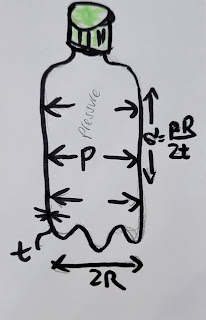 |
| PET bottle - Learn how to optimize the wall thickness |
Hello and welcome to a new post. Today I will discuss with you how to optimize the wall thickness of well- known PET bottles by using safety factors and the stress equations.
What are some requirements for carbonated bottles?
In general, PET drink containers need to contain the pressure of dissolved C02 safely, easy processing via moulding / blow moulding, transparent or translucent, and must be recyclable. PET bottles are the cheapest solution to fulfill the aforementioned requirements. Next best alternative would be PLA which has the lowest embodied energy [1].
What equations do we need?
Figure 1 shows the internal pressure situation of a carbonated drink bottle. Tensile stresses along the walls are created due to the internal pressure p inside the bottle. There are two stresses, the circumferential stress (𝛔c = pr/t) and the axial stress (𝛔a = pr/2t). t is the wall thickness and r is the radius of the bottle. Based on those, we can derive the must-have wall thickness so that the stresses are not leading to bottle failure: t= S [(pr)/(𝛔y)]. S is representing a safety factor and 𝛔y is the yield strength of the wall material.
 |
| Figure 1: internal pressure situation of a carbonated drink bottle. |
Example: wall optimization of carbonated PET bottle
In literature it can be found that the working pressure of a standard soda PET bottle is 0.5 MPa and has a diameter of 2r = 64 mm. As a safety factor we take 2.5. 70 MPa is the tensile strength of PET at room temperature.
How thick do we need to make the walls to handle the pressure safely?
We start with our equation from before: t= S [(pr)/(𝛔y)]
t= 2.5 [(0.5x0.032)/(70)] = 0.00057 m = 0.57 mm
The required wall thickness t is 0.57 mm. After consuming your next soda drink in a PET bottle, you can check the wall thickness and see if the bottle already uses as little PET as possible.
In another post I show how to select the optimal polymer material for an injection / blow moulded water bottle.
Thanks for reading and #findoutaboutplastics
Greetings,
Herwig Juster
Interested to talk with me about your plastic selection, sustainability, and part design needs - here you can contact me
Literature:
[1] Michael Ashby: Materials and the Environment. Eco-informed Material Choice

This comment has been removed by the author.
ReplyDelete